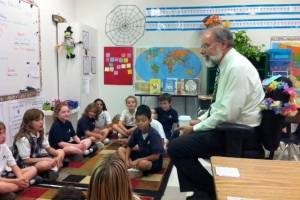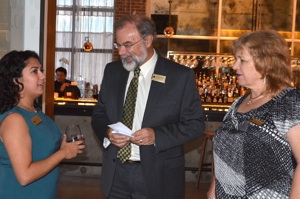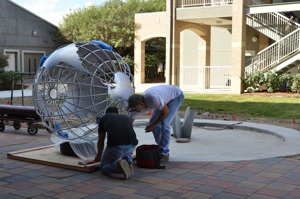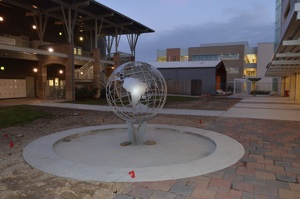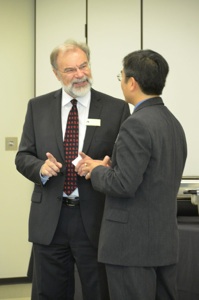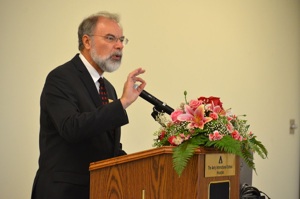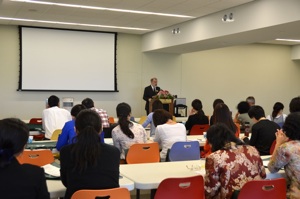If variety is the primary measure of what makes a good week, then I have had a fabulous week.
As I often say, the greatest joy in my job comes from mixing with our wonderful students. I was invited to visit two different third grade classes this week – invitations which I accepted immediately of course. The students in these two classes had
written me some lovely notes and prepared some delightful cards (showing me their VERY impressive handwriting skills), and in those writings they had asked me some questions. Naturally, the best way to answer their questions was to sit down with them and have a chat.
The students
were well prepared with a vast range of questions such as ‘what is your favorite Australian animal?’, ‘have you ever climbed Uluru?’, ‘which is your favorite country in the world to visit?’, ‘have you ever walked on the Great Wall of China?’, ‘what is your favorite animal in the whole world?’ and ‘in what ways is Houston different from Australia?’. As always. I found our students to be bright, curious, perceptive, articulate and engaging as they posed their open-ended questions that led on to many other thoroughly enjoyable to-and-fro topics.
Another very enjoyable function this week was meeting over dinner with some of our top donors to the Annual Fund. Hosted by two of our parents, Mr Chong Yi and Mrs Faranak Kamali at their widely acclaimed contemporary restaurant, Triniti (
http://www.trinitirestaurant.com), this was a great opportunity to thank those people who have demonstrated their strong and generous commitment to our Annual Fund. I was thrilled to be able to announce to those present that 100% of our senior administrators have already given to this year’s annual fund, and although the new academic year is still young, we already have an 83% participation rate from our faculty and staff. It is a great feeling to be able to thank those who feel so passionately about the education of young people.
Work continues on the finishing touches to the landscaping around our new parking garage. This week we set in place a large sculptured globe that was a gift from the graduating class of 1995 – most things at Awty move very quickly but putting this gift from 1995 in place took a little longer than most. I hope that the globe will send a very powerful,
permanent welcoming message to greet everyone who walks into the school from the drop off area in our parking garage – the message that building international understanding through education is the cornerstone of this school’s purpose and identity.
A visible expression of our internationalism occurred last Sunday when Awty hosted the annual meeting of the Chinese Language Teachers Association of Texas (CLTA). I felt very privileged to be asked to deliver the welcoming message by the President of the CLTA, Awty’s very own Ms Jiayao Pang, in the
presence of the Chinese Consul of Education in Houston, Ms Xu Baiyu.
In my welcome speech, I spoke in some detail about research that highlights the educational benefits of learning Chinese for students from Western backgrounds. I won’t bore you with those details here, but I concluded my address by recalling one of my favorite traditional Chinese folk tales – the story of the Foolish Old Man who removed the mountains – which I used to pose some personal and professional challenges to the audience. Let me share it with
you too …
Once upon a time, long ago in northern China, lived an old man who was known by everyone as the Foolish Old Man of the North Mountain. His house faced south, and in front of his house there were two big mountains blocking his view. So one day, the Foolish Old Man called his two family together and said, ‘These two huge mountains are in the way. Let’s all pitch in and move them away!’. His sons and his grandsons all agreed that this was a good idea.
The next day, the Foolish Old Man took his whole family to move away the mountains and with the hoes they began to dig away at the first mountain. They went out early with their wheelbarrows and they came home each night after dark. Ignoring any difficulty, they dug away at the mountains, day after day, week after week.
Another old man, known by the locals as the Wise Old Man, saw them trying to move away the mountains and thought it was ridiculous. So he went up to the Foolish Old Man and said “You are so silly! It is quite impossible for you to dig up these two huge mountains. How can you get rid of the mountains at your age?” And the Foolish Old Man replied “Although I will die, there will still be my sons. After they die, there will be my grandsons, and then their sons and grandsons, and so on. We will have more and more people, while the mountains will have fewer
and fewer stones. The mountains will not grow any higher, and with every bit that we dig, they will be that much lower. As long as we have the determination, we can surely remove the mountains”.
When the Wise Old Man heard that, he had nothing more to say, so he walked away while the Foolish Old Man and his sons went on digging every day. And the story finishes when the Foolish Old Man’s determination moved God, who sent down two angels to carry away the mountains on their backs.
Although this is an ancient Chinese fable, Mao Zedong told that story to inspire and encourage the masses during the Chinese civil war that brought him and the Communist Party
to power in 1949. When he told that story, Chairman Mao said that at that time, two big mountains lay like a dead weight on the Chinese people. One was imperialism, and the other was feudalism. He said that if the Chinese people stand up and dig together with the party, then those two big mountains will surely be cleared away.
That story challenged the Chinese people in the 1940s, and I used it to challenge the teachers attending last Sunday’s conference. I asked them this: as teachers of Chinese language, what do you think are the two mountains that you need to start chipping away at? Is it negative attitudes of your school administrators towards learning Asian languages? Is it the hesitation of students to take up the challenge of learning a language with tones and characters? Is it the view of parents that learning languages is only worthwhile if it promotes trade and raises incomes? Is it the shortage of student-friendly resources?
In a similar vein, I would like to challenge the readers of this blog to ask themselves – what are the mountains (or large obstacles) that you face in your personal or professional life? I encourage you to identify those mountains, and begin chipping away at them in the spirit of the Foolish Old Man who removed the mountains.








